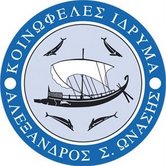 On 7 May 2009 the European Union and Armenia, Azerbaijan, Belarus, Georgia, Moldova and Ukraine will officially launch the new Eastern Partnership, which was originally proposed by Poland and Sweden. At a lecture , organised by the Alexander S. Onassis Foundation and the Hellenic Foundation for European & Foreign Policy (ELIAMEP) on April 8th, held at the Onassis Foundation, Professor Helen Wallace, who is currently Onassis Fellow in Athens, spoke on The European Union and its Neighbourhood: The Need for a Rethink.
On 7 May 2009 the European Union and Armenia, Azerbaijan, Belarus, Georgia, Moldova and Ukraine will officially launch the new Eastern Partnership, which was originally proposed by Poland and Sweden. At a lecture , organised by the Alexander S. Onassis Foundation and the Hellenic Foundation for European & Foreign Policy (ELIAMEP) on April 8th, held at the Onassis Foundation, Professor Helen Wallace, who is currently Onassis Fellow in Athens, spoke on The European Union and its Neighbourhood: The Need for a Rethink.
In her speech, Professor Wallace concentrated on the perspectives of Eastern Partnership, which is a newly developed initiative concerning the EU’s eastern neighbourhood based on two pillar. The bilateral component of Eastern Partnership includes Association Agreements, economic integration by means of “deep free trade areas” with each country; “mobility and security pacts” to open up scope for free movement of individuals; and measures to promote energy security. The multilateral dimension of Eastern Partnership will concentrate on four thematic platforms – democratic governance, economic integration, energy, soft measures to promote contacts – and will rely on an institutional structure including meetings on the level of heads of state and government as well as ministerial and expert meetings.
Professor Wallace warned that important aspects have up till now been omitted in the Eastern Partnership initiative: What about cooperation in the area of Common Foreign and Security Policy and in defense issues? What about the frozen conflicts in and among some of these countries? How are Russia and Turkey involved in Eastern Partnership? How is the Eastern Partnership linked with NATO?
At the end of her lecture, Professor Wallace called on the EU to develop a more comprehensive policy. For this purpose,
(i) the EU should review its firm distinction between countries that are actual or potential EU candidates and those that are on the other side of this line;
(ii) more attention should be given to how EU policy is developed in relation to the policies of other international agencies and organisations towards the region;
(iii) finally, Professor Wallace, argued that the success of the initiative will require the engagement of a larger number of EU member states in the development of the Eastern Partnership.
Interview with Professor Helen Wallace.
For more information on Eastern Partnership see:
http://ec.europa.eu/external_relations/eastern/index_en.htm
http://www.eliamep.gr/en/frontpage/top-story-2/generating-georgias-input-for-eastern-partnership/
Professor Wallace’s CV.



